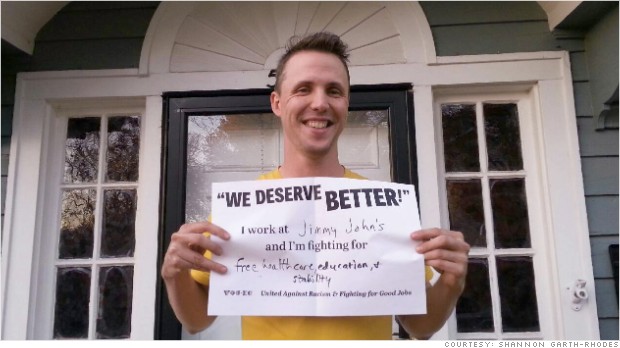 Bobby
Bingham works 4 jobs, shares a one-bedroom apartment with a roommate,
has virtually no money saved and can't remember the last time he took a
vacation.
Bobby
Bingham works 4 jobs, shares a one-bedroom apartment with a roommate,
has virtually no money saved and can't remember the last time he took a
vacation.
NEW YORK (CNNMoney)
Bobby Bingham works four jobs in Kansas City, Missouri, yet he has very little to show for it.
Bingham is 37 years old and has a college degree, but like many Americans, is stuck working many hours in low wage, part-time jobs.Each week, he works a total of about 60 hours in his jobs as a massage therapist, a waiter at a Mexican restaurant, a delivery man for sandwich chain Jimmy John's and a receptionist at his massage school.
He brings home about $400 a week, or $20,000 per year, and has joined the nationwide movement of fast food protests fighting for higher wages.
"I've come to the point in my life where I wonder if I can ever support a family," he said. "I have no idea how that's ever going to logically happen."
Bingham's is an increasingly common story. The share of part-time workers who couldn't find full-time jobs surged during the Great Recession, more than double what it was in the preceding decade. Though their situation is improving now, more than 7.7 million Americans are still settling for part-time work, compared to about 4.1 million on average in 2006.
Related: The myth of the American Dream
Here's what one week of juggling schedules and part-time paychecks looks like for Bingham:
- 24 hours waiting tables at Mexican restaurant Taco Republic. He makes tips plus $2.13, which is the federal minimum wage for tipped employees, like waiters.
-30 hours delivering sandwiches for Jimmy John's, which pays him $7.35 an hour, plus tips.
-3 one-hour massages, for a total of $60.
-9 hours as a receptionist at his former massage school. (The amount of money he makes working at the school isn't included in his $400 weekly pay, since it goes directly to repay $9,500 worth of student loans.)
Bingham shares a one-bedroom apartment with a roommate, has virtually no money saved and can't remember the last time he took a vacation.
This is not where Bingham thought he'd be. After struggling to make ends meet while also intermittently attending college, he finally graduated in 2008 with a bachelor's degree in liberal arts from University of Missouri, Kansas City. He had even higher hopes from his massage therapy degree.
"My family told me, 'just get your degree and it will be fine,'" he said. "A degree looks very nice, but I don't have a job to show for it."
But Bingham, like millions of other hourly wage earners, doesn't know if there is a possible path to a higher paying job. In fact, wages fell for the entire bottom 70% of the wage distribution during the Great Recession and its aftermath, according to research from the Economic Policy Institute.
And he feels like there aren't a whole lot of places to go from here. He can't afford to go back to school, and even if he could, Bingham said it wouldn't be worth it. He doesn't have time to take on a fifth job.
Related: Sick days: A luxury many hourly workers don't have
So he has turned to the fast food protests in hopes of improving his current situation.
He walked off work last Thursday as part of a nationwide day of action planned by union-backed groups like Fight for $15 and Fast Food Forward. Organizers say that workers in more than 100 cities were calling for fast food chains to increase their wages to $15 an hour.
Currently, the nationwide average hourly wage for fast food workers is just over $9 an hour, or about $18,500 a year.
The low-wage protest movement began with a small walkout by fast food workers in New York City in November 2012 and has since picked up steam. Strikes this past August drew fast food workers in 60 cities, organizers said.
Bingham said the protests are the only way he sees things getting better.
"The only choice I have is to go into work and do this," he said. "Looking around and seeing all these other people I work with, they don't see any other choices either."
No comments:
Post a Comment